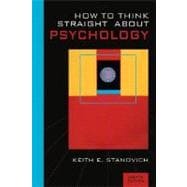
| Preface | xi | ||||
| 1 Psychology Is Alive and Well (and Doing Fine Among the Sciences) | 1 | (18) | |||
|
1 | (1) | |||
|
2 | (4) | |||
|
3 | (3) | |||
|
6 | (2) | |||
|
8 | (5) | |||
|
9 | (1) | |||
|
10 | (2) | |||
|
12 | (1) | |||
|
13 | (4) | |||
|
17 | (1) | |||
|
18 | (1) | |||
| 2 Falsifiability: How to Foil Little Green Men in the Head | 19 | (16) | |||
|
20 | (11) | |||
|
21 | (1) | |||
|
22 | (2) | |||
|
24 | (2) | |||
|
26 | (1) | |||
|
27 | (1) | |||
|
27 | (3) | |||
|
30 | (1) | |||
|
31 | (2) | |||
|
33 | (2) | |||
| 3 Operationism and Essentialism: "But, Doctor, What Does It Really Mean?" | 35 | (18) | |||
|
35 | (7) | |||
|
36 | (1) | |||
|
37 | (1) | |||
|
38 | (2) | |||
|
40 | (1) | |||
|
40 | (2) | |||
|
42 | (9) | |||
|
45 | (1) | |||
|
46 | (2) | |||
|
48 | (3) | |||
|
51 | (2) | |||
| 4 Testimonials and Case Study Evidence: Placebo Effects and the Amazing Randi | 53 | (20) | |||
|
55 | (1) | |||
|
56 | (4) | |||
|
60 | (7) | |||
|
63 | (2) | |||
|
65 | (2) | |||
|
67 | (4) | |||
|
71 | (2) | |||
| 5 Correlation and Causation: Birth Control by the Toaster Method | 73 | (12) | |||
|
74 | (4) | |||
|
75 | (3) | |||
|
78 | (2) | |||
|
80 | (3) | |||
|
83 | (2) | |||
| 6 Getting Things Under Control: The Case of Clever Hans | 85 | (18) | |||
|
86 | (1) | |||
|
87 | (15) | |||
|
88 | (3) | |||
|
91 | (1) | |||
|
92 | (2) | |||
|
94 | (3) | |||
|
97 | (2) | |||
|
99 | (2) | |||
|
101 | (1) | |||
|
102 | (1) | |||
| 7 "But It's Not Real Life!": The "Artificiality" Criticism and Psychology | 103 | (16) | |||
|
103 | (7) | |||
|
105 | (1) | |||
|
105 | (1) | |||
|
106 | (4) | |||
|
110 | (7) | |||
|
112 | (4) | |||
|
116 | (1) | |||
|
117 | (2) | |||
| 8 Avoiding the Einstein Syndrome: The Importance of Converging Evidence | 119 | (22) | |||
|
120 | (4) | |||
|
121 | (2) | |||
|
123 | (1) | |||
|
124 | (6) | |||
|
126 | (4) | |||
|
130 | (5) | |||
|
131 | (2) | |||
|
133 | (2) | |||
|
135 | (3) | |||
|
138 | (3) | |||
| 9 The Misguided Search for the "Magic Bullet": The Issue of Multiple Causation | 141 | (8) | |||
|
142 | (2) | |||
|
144 | (3) | |||
|
147 | (2) | |||
| 10 The Achilles' Heel of Human Cognition: Probabilistic Reasoning | 149 | (56) | |||
|
150 | (2) | |||
|
152 | (1) | |||
|
153 | (10) | |||
|
154 | (2) | |||
|
156 | (1) | |||
|
157 | (4) | |||
|
161 | (2) | |||
|
163 | (2) | |||
|
165 | (18) | |||
|
165 | (10) | |||
|
168 | (2) | |||
|
170 | (1) | |||
|
171 | (3) | |||
|
174 | (1) | |||
|
175 | (6) | |||
|
181 | (2) | |||
|
183 | (22) | |||
|
183 | (6) | |||
|
184 | (2) | |||
|
186 | (1) | |||
|
187 | (2) | |||
|
189 | (2) | |||
|
191 | (6) | |||
|
197 | (1) | |||
|
198 | (4) | |||
|
202 | (3) | |||
| References | 205 | (26) | |||
| Author Index | 231 | (7) | |||
| Subject Index | 238 |
The New copy of this book will include any supplemental materials advertised. Please check the title of the book to determine if it should include any access cards, study guides, lab manuals, CDs, etc.
The Used, Rental and eBook copies of this book are not guaranteed to include any supplemental materials. Typically, only the book itself is included. This is true even if the title states it includes any access cards, study guides, lab manuals, CDs, etc.